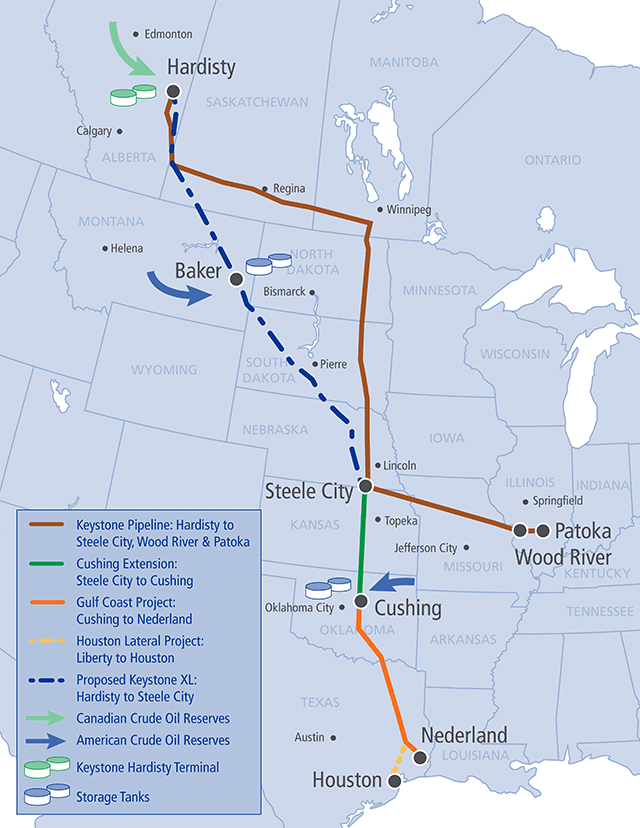Oil & Gas 360® polled three international law experts to gauge the viability of the $15 billion Keystone XL legal action by TransCanada
The saga that started back in 2008 continues.
The Keystone XL oil pipeline did not die with a slammed door from White House. At least, not from the point of view of its sponsor’s corner office in Calgary.
TransCanada Corporation (ticker: TRP) is seeking compensation from the U.S. after President Obama officially turned down its application to build the Keystone XL , following eight years of mega-politicized sparring between the environmental movement and energy independence and jobs growth proponents over the $8 billion North American trans-border pipeline project. TransCanada’s lawsuit in the U.S. Federal Court in Houston, Texas, asserts that the president exceeded his power under the U.S. constitution by rejecting an interstate and international commerce project.
The company also filed a notice to initiate a claim under Chapter 11 of the North American Free Trade Agreement (NAFTA), saying that the administration’s decision was arbitrary and unjustified. The State Department acknowledged the denial was not based on the merits of the project. Rather it was a symbolic gesture based on the administration’s goal to appear environmentally conscious. TransCanada is seeking $15 billion in compensation for costs and damages that it has suffered “as a result of the U.S. Administration’s breach of its NAFTA obligations,” the company said in its release.
Under Chapter 11 of NAFTA, members agree to treat investors of the other NAFTA nations no less favorably than their own. In other words, each member should receive “most-favored-nation treatment” from its partners in NAFTA, something TRP says the U.S. administration failed to do when it rejected Keystone XL for reasons other than the merits of the project. For all intents and purposes, the pipeline project had already been approved and permitted by the states and counties it would traverse, after almost a decade of environmental studies, hearings and permitting activities, a process that the company has said usually takes only about two years.
NAFTA: Canadian companies have been “singularly unsuccessful” in seeking compensation
Unfortunately for TransCanada, history is not on the company’s side. No Canadian company has ever been able to win a suit against the U.S. government under this chapter of NAFTA.
“Canadian companies have been singularly unsuccessful in seeking compensation from the U.S. under Chapter 11,” Brad Richards, a partner at Haynes and Boone told Oil & Gas 360®. “The question is one of discrimination and a violation of international law. It will be a hard case to win.”
 The Keystone XL suit does have legs
The Keystone XL suit does have legs
Despite the historical precedent not being in favor of the Keystone XL suit, it does still have merit according to the experts, and history may not be the best guide in this case.
“There have been around a dozen [of these kinds of cases],” Dr. Todd Weiler, another international lawyer whose practice focuses exclusively on investment treaty arbitration, told Oil & Gas 360®. “It’s too small of a sample size to look at,” Weiler said, for answers about how the TransCanada case may turn out.
It will still be an uphill battle for TranasCanada, however. “Congress tried to pass a law specifically approving this pipeline, but it was vetoed and Congress didn’t have enough votes to overturn that veto, so TransCanada cannot say the president violated the law – simply that he exceeded his authority,” a harder case to make, said Haynes and Boone’s Richards.
The case will come down to whether or not TransCanada can prove that it was not treated fairly and equitably. Looking at similar projects, it appears that Keystone XL was hijacked for political purposes, which could go a long way in proving TransCanada’s point, Weiler said.
Years of legal battles likely face TransCanada
Regardless of which way the decision goes, the road ahead of the Keystone XL suit is a long one. “These kinds of cases take two to four years typically, but this one is likely to be four or more [years.] Because of the size of the case, this one is in a league of its own [compared to other NAFTA cases,]” said Weiler, who has worked on a number of NAFTA-related cases.
“There is no basis in U.S. federal court for TransCanada to obtain compensation for the expenses of its investment in the pipeline,” said Richards. “TransCanada will [likely] slow down the arbitration [on the NAFTA claim] to see if they can win in court first. If they win in court, and get a court decision that says that the president didn’t have the power to deny the permit, it makes it easier for them to win compensation in the NAFTA arbitration.”
The federal case in Houston will likely be appealed to the Fifth Circuit, and potentially move on to the Supreme Court from there said Richards. Richards pointed to recent cases on the assertion of presidential power that have gone both ways. “It is not easy to guess at this time how the Supreme Court might rule.”
Even if TransCanada does win, it’s not clear if that means the company could build Keystone XL. “Arguably, the State Department could simply say that it will go back and make a new decision,” said Richards.
TransCanada may not see the $15 billion…
“Do not put a lot of stock in that $15 billion number,” Dr. David Gantz, director emeritus of the international economic law and policy program at The University of Arizona, told Oil & Gas 360®. “When you’re dealing with a pre-investment problem like this, they probably won’t get what they thought [in terms of damages.]”
NAFTA arbitration is judged by a panel of three judges, a fact that is “extremely controversial” said Richards. If the panel does decide to award TransCanada damages, it will have to decide what exactly TransCanada lost by not receiving approval on Keystone XL.
“No one wants to speculate what they could have made with oil prices fluctuating so much,” said Gantz.
What’s more likely is that TransCanada could receive the money it has already invested in the Keystone XL project back, which was estimated last year to be about $2.5 billion in a prior interview between Oil & Gas 360® and Corey Goulet, TransCanada’s president of Keystone projects. “They might recover what they put in to get the permits,” said Gantz. Given that the final rejection of the pipeline took years longer than the typical approval process, TransCanada may also have a case for collecting interest on its investments as well said Weiler.
… But money may not be the primary concern
“This could be more about politics,” said Weiler. “The White House won’t be able to claim executive privilege and move on.”
Executive privilege allows the president to withhold information from Congress and the courts if it is deemed to be in the service of the public interest, a power sometimes abused in the past, but because NAFTA is an international treaty, it will be arbitrated under international law, where the president’s executive privilege is not recognized.
The executive branch may have to produce documents showing that it knew the pipeline would not be approved long before TransCanada was officially informed. In effect, TRP could force the administration to air its dirty laundry regarding the unusually long permitting process it was subjected to for this particular project.
“[The case] is designed to win approval, because TransCanada thinks it still may be able to complete the rest of the pipeline,” said Richards. “The pipeline won’t make sense until prices recover. Thus, the short-term motivation may be to demonstrate to the market that TransCanada is doing something (to protect the company’s rights) and the long-term motivation may be to see if they can get the U.S.-Canada portion completed in a few years when it will make more economic sense.”







